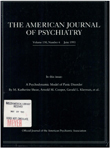Substance abuse disorders: a psychiatric priority. Group for the Advancement of Psychiatry Committee on Alcoholism and the Addictions
Abstract
The renewed public, governmental, and professional interest in addictive disorders should serve to encourage the interest of psychiatrists in this important and rapidly changing field. It is the view of the Group for the Advancement of Psychiatry (GAP) Committee on Alcoholism and the Addictions that all psychiatrists should possess expertise in the recognition, assessment, and treatment of substance use disorders. This position paper by the GAP committee reviews the role of the psychiatrist in the evaluation and treatment of patients with substance use disorders. It also notes some of the obstacles to full involvement in this field by medical practitioners in general and psychiatrists in particular. The psychiatrist has a critical role to play in the diagnosis and treatment of patients with substance use disorders. As biopsychosocial phenomena, substance abuse problems constitute a special and direct challenge to the psychiatrist, whose training, perspective, and competence should span all three domains. Psychiatrists must be willing to accept this challenge and fully participate in the development and application of treatment strategies adequate to cope with the enormous human suffering resulting from the abuse of alcohol and other psychoactive drugs.
Access content
To read the fulltext, please use one of the options below to sign in or purchase access.- Personal login
- Institutional Login
- Sign in via OpenAthens
- Register for access
-
Please login/register if you wish to pair your device and check access availability.
Not a subscriber?
PsychiatryOnline subscription options offer access to the DSM-5 library, books, journals, CME, and patient resources. This all-in-one virtual library provides psychiatrists and mental health professionals with key resources for diagnosis, treatment, research, and professional development.
Need more help? PsychiatryOnline Customer Service may be reached by emailing [email protected] or by calling 800-368-5777 (in the U.S.) or 703-907-7322 (outside the U.S.).



